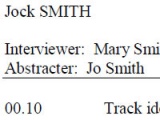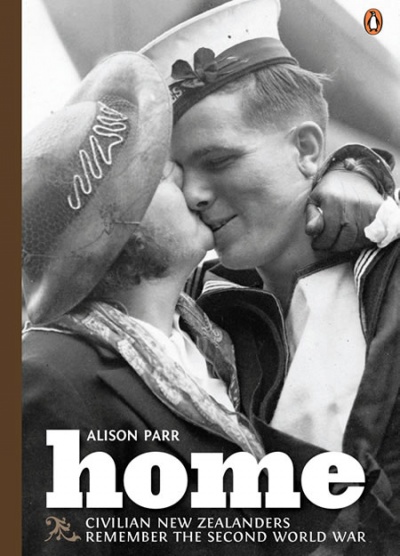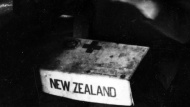Articles
War oral history programme

Information about the now completed From Memory oral history project, including advice on how to interview war veterans
-
Page 2 – Before you begin
What to do before you begin interviewing war veterans
-
Page 3 – Working with war veterans
Gathering oral history from elderly war veterans requires particular awareness and sensitivity.
-
Page 4 – Finding interviewees
A guide to finding war veterans to interview.
-
Page 5 – Second World War
One hundred and forty thousand New Zealanders served overseas in the Second World War as soldiers, airmen, sailors and nurses.
-
Page 6 – Notes and questions, Greece/Crete
Suggested questions for oral history interviews with veterans of the Greece/Crete campaign
-
Page 7 – Notes and questions, North Africa
Questions for oral history interviews with veterans of the North African campaign
-
Page 8 – Notes and questions, Italy
Questions for oral history interviews with veterans of the Italy campaign
-
Page 9 – Notes and questions, Pacific
Questions and background information for interviewing war veterans of the Pacific Theatre in the Second World War
-
Page 10 – Notes and questions, POWs
Advice and suggested questions for interviewing veterans who were prisoners of war
-
Page 11 – Notes and questions, Royal Navy and Royal Air Force
Advice and suggested questions for interviewing Royal Navy and Royal Air Force veterans
-
Page 12 – Notes and questions, merchant seafarers
Advice and suggested questions for seafarers from the Second World War
-
Page 13 – Further information
A good oral history is always well researched. In the background notes and questions section for each campaign we offer a brief summary of the different campaigns and aspects
Oral history guide

Oral history is a method of gathering information. It is the sound or video recording of an interview with someone who speaks from personal experience about a subject of historical interest.
-
Page 2 – Preparation
To record oral history you will need to use the best quality equipment you can buy, borrow or hire. Poor sound recordings will be of little use to researchers in the future.
-
Page 3 – Preliminary meeting
Never go to record an oral history interview without a preliminary meeting with your interviewee. It is essential that you have told your interviewee enough to enable them
-
Page 4 – The interview
Advice and suggestions for planning and carrying out the oral history interview
-
Page 5 – Processing the interview
Advice on what to do with an interview after recording it
-
Page 6 – Equipment
It is vital that oral history recordings are of the best possible quality, and equipment is a major factor in ensuring this.
The Second World War at home

Nearly one and half million people spent the Second World War at home in New Zealand. For most, life changed: families and relationships were disrupted, government directives controlled people’s lives and, for many, there was the constant threat of terrible loss.
-
Page 6 – In dissent
New Zealanders who publicly opposed the war were in a very small minority. They came from two main groups: communists and pacifists.
-
Page 8 – Interviewees
This feature is based on the book by Alison Parr Home: Civilian New Zealanders remember the Second World War published by the Penguin Group in 2010.
War in the Pacific

Thousands of New Zealanders fought in the Pacific War, which was sparked by the Japanese bombing of the American naval base at Pearl Harbor on 7 December 1941. It was a conflict fought on a vast scale over huge distances. For the New Zealanders, this was a war fought close to home.
- Page 5 - Soldier's storiesNew Zealanders who served in the Pacific War had diverse experiences. They were involved in fighting in the jungle, some spent time in Japanese prisoner of war camps, others took
The North African Campaign

The second battle of El Alamein, which began 70 years ago this month, was the turning point of the war in North Africa. For New Zealand forces, this was longest and most important land campaign of WWII. But victory came at a heavy price: between 1941 and 1943, 14,000 Kiwis were killed, wounded or became prisoners of war.
- Page 7 - Kiwi storiesSelected audio extracts of New Zealanders involved in the North African
The Battle for Crete

It remains the most dramatic battle ever fought by New Zealand forces. Over 12 brutal days in May 1941 the Allies opposed a massive German airborne assault on the Mediterranean island of Crete. They almost succeeded.
- Page 9 - Kiwi storiesSelected audio extracts of New Zealanders involved in the Battle for
Korean War

New Zealand was involved militarily in Korea from 1950 to 1957, first as part of the United Nations 'police action' to repel North Korea's invasion of its southern neighbour, and then in a garrison role after the armistice in July 1953.
- Page 10 - Kiwi storiesListen to some of the stories of New Zealanders involved in the Korean War, 1950-1957.
Related keywords
- korean war
- WW2
- cold war
- 1950s
- DDay
- royal air force
- WW2 stories
- dunsandel
- royal navy
- interviewing veterans
- north african campaign
- italian campaign
- merchant navy
- seafarers
- greece
- crete
- battle for crete
- prisoners of war
- pacific war
- guadalcanal
- holidays
- immigrants
- navy
- battle of the river plate
- immigration
- english
- shipping
- aquitania
- assisted immigration
- japanese
- royal new zealand air force
- WW1
- passchendaele offensive
- VJ day
- leisure
- sport
- movies
- food
- red cross
- battle of cassino
- cooking
- disasters
-
Cover of Alison Parr's book about the experiencs of civilian New Zealanders in the Second World War


































































